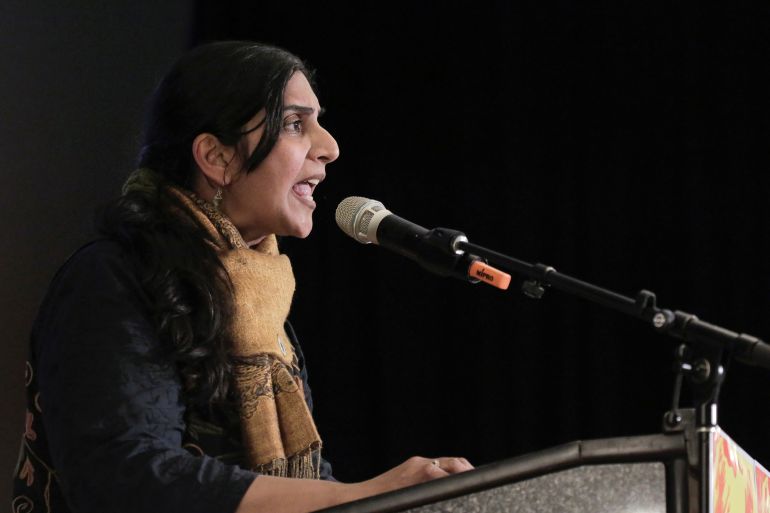Seattle council to vote on law banning caste discrimination
City councillor says proposed bill would help end ‘invisible and unaddressed’ problem affecting South-Asian Americans.

A councillor in Seattle has taken a historic step in the fight against caste-based discrimination by proposing the first-ever legislation in the United States to directly outlaw the practice.
Kshama Sawant, Seattle’s only Indian-American city councillor, said in proposing the legislation last month that South Asian Americans face caste discrimination in employment, education and housing. She wants to expand the city’s existing anti-discrimination policy to protect those targeted because of their caste.
Keep reading
list of 3 itemsAir India unveils ‘historic’ orders for 470 Boeing, Airbus jets
India, set to be most populous, doesn’t know its number of people
The two-millennium-old caste system is practised in countries such as India, where Dalits, formerly known as “untouchables”, lie at the bottom of the hierarchy.
Sawant says the proposed legislation, which goes to a vote on February 21, would help put an end to an “invisible and unaddressed” form of discrimination in Seattle, home to an estimated 75,000 Indian Americans.
“Caste discrimination is a very serious issue in the United States,” Sawant told Al Jazeera. “Lower-caste community members from South Asian and other immigrant backgrounds often face discrimination, especially in the workplace.”
The caste system was officially banned in India in 1950 but it continues to permeate many aspects of daily life and has spread to diaspora communities in the West. Under this system, caste is imposed at birth and lower-caste members are assigned menial work considered unfit for the upper castes.
‘Laws needed’
According to the first-ever survey on caste discrimination in the US, conducted in 2016 by Equality Labs, at least 25 percent of Dalits in the country said they had faced verbal or physical assault, while two out of three reported being treated unfairly in the workplace.
Many have called for stronger legal protections against caste discrimination.
Samir, who spoke to Al Jazeera on the condition his last name be withheld, said he had kept his caste a secret from his colleagues in Seattle’s tech industry for nearly a decade for fear of discrimination. But in 2020, he decided to address the issue publicly in an online post.
He believes the US must evolve to account for the biases imported by some immigrants.
“It would be naive to believe that as soon as a person takes a flight to the US, their biases are magically gone,” he said. “While education and public awareness are our weapons in our fight for equality, unfortunately, it is not enough. Laws and legislation are also needed … [to] help ensure that social change is sustainable.”
The issue of caste discrimination in the US has repeatedly made headlines, including in 2020, when California regulators sued Cisco Systems Inc for allegedly discriminating against a Dalit employee. Cisco has said it acted in compliance with all laws and internal policies and promised a “vigorous” defence.
The case, which is still pending, prompted Apple to update its policies to explicitly prohibit caste discrimination, making it the first tech giant to do so.
And in 2021, a federal lawsuit spanning five US states accused a prominent Hindu organisation, BAPS, of trafficking Dalit workers from India and forcing them to work at wages as low as $1.20 an hour to build temples under harsh conditions. BAPS has denied the allegations.
The renewed conversation about caste has also prompted some US colleges and universities to step up protections for Dalit students, such as by adding caste to internal anti-discrimination policies.
Support for victims
Anil Wagde, an activist with the Ambedkar International Center (AIC), a Maryland-based Dalit-rights group involved in helping to draft the Seattle legislation, said its passage could educate public institutions, corporations and civil society on how caste bias operates.
“It will also provide much-needed protection and support for victims of caste discrimination and violence to confront their perpetrators,” Wagde told Al Jazeera.
Prashant Nema, an activist with the Silicon Valley-based Ambedkar King Study Circle – a group that aims to challenge caste, race, gender and other forms of oppression in politics and society and that also contributed to the proposed legislation – agreed: “There are many ways the caste-oppressed can get discriminated against, excluded and even harassed in America, due to a lack of legal ways to handle these situations,” he told Al Jazeera. “[The bill’s] passage will create a rule of law.”
But some groups have raised objections, including the Coalition of Hindus of North America, urging Seattle’s city council to reject the legislation.
“This exclusive focus on one community is discriminatory in itself and this needs to be opposed by fair minded people who value equal treatment,” a coalition spokesperson told Al Jazeera in an emailed statement. “Existing laws around ancestry and national origin can be used to prosecute legitimate cases of caste discrimination.”
Sawant said this is a typical right-wing talking point and an attempt to stifle the rights of oppressed-caste members in the US: “To say that protecting lower-caste Indian Americans against discrimination would target Indian Americans from other castes is like saying addressing racism against Black and brown people would negatively affect white people.”
Meanwhile, for Dalits in other US cities, the introduction of anti-caste legislation in Seattle has raised hopes for nationwide action.
The proposed state legislation “is small, but a landmark moment for us”, Dolly Arjun, a Dalit-American activist from Boston, told Al Jazeera. “But it’s just the beginning. We aim to have a nationwide ban against this despicable and inhumane practice of the caste system.”